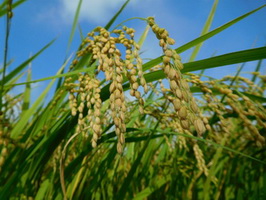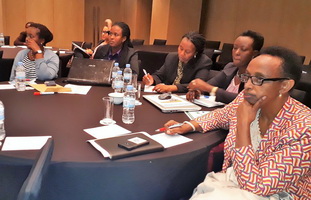|
|
Scientists Discover Way to Make Rice Plants Replicate through Seeds as Clones |
 Researchers at the University of California, Davis (UC Davis), have discovered a way to make rice plants replicate through seeds as clones. Though 400 species of wild plants produce viable seeds without fertilization, the same process has not evolved in most commercial crop species. The work led by postdoctoral researcher Imtiyaz Khanday and Venkatesan Sundaresan, professor of plant biology and plant sciences at UC Davis, is a major step forward. Researchers at the University of California, Davis (UC Davis), have discovered a way to make rice plants replicate through seeds as clones. Though 400 species of wild plants produce viable seeds without fertilization, the same process has not evolved in most commercial crop species. The work led by postdoctoral researcher Imtiyaz Khanday and Venkatesan Sundaresan, professor of plant biology and plant sciences at UC Davis, is a major step forward.
|
|
|
|
|
Rwandan Women in Biosciences Embrace Science Communication |
|
 Rwanda women scientists have applauded effective science communication as key to ensuring smallholder farm families appreciate the role of advanced biosciences in addressing food insecurity, malnutrition, and environmental conservation. This came up during a series of stakeholder experience-sharing sessions on contributions of agricultural biotechnology in transforming African agriculture. Lessons learned over 22 years of adoption indicate benefits to farmers, consumers, and the environment with more than 10% of arable land under biotech crops. Dr Marie-Christine Gasingirwa, Higher Education Council and formerly Director General for Science, Technology and Research in the Ministry of Education in Rwanda said the country is at a vantage position to tap into regional experiences from neighboring countries instead of re-inventing the wheel. Acknowledging the primary role of women in raising awareness about scientific innovations from family, school, and the community, she encouraged the women scientists to increase interaction with stakeholders to correct long-held myths and misinformation about modern biotechnology. "Together as women in bioscience, let's start from what is working, while enhancing the capacity of our researchers to develop relevant GM crops as regulators conduct risk assessment on biodiversity and biosafety in general," she advised. Rwanda women scientists have applauded effective science communication as key to ensuring smallholder farm families appreciate the role of advanced biosciences in addressing food insecurity, malnutrition, and environmental conservation. This came up during a series of stakeholder experience-sharing sessions on contributions of agricultural biotechnology in transforming African agriculture. Lessons learned over 22 years of adoption indicate benefits to farmers, consumers, and the environment with more than 10% of arable land under biotech crops. Dr Marie-Christine Gasingirwa, Higher Education Council and formerly Director General for Science, Technology and Research in the Ministry of Education in Rwanda said the country is at a vantage position to tap into regional experiences from neighboring countries instead of re-inventing the wheel. Acknowledging the primary role of women in raising awareness about scientific innovations from family, school, and the community, she encouraged the women scientists to increase interaction with stakeholders to correct long-held myths and misinformation about modern biotechnology. "Together as women in bioscience, let's start from what is working, while enhancing the capacity of our researchers to develop relevant GM crops as regulators conduct risk assessment on biodiversity and biosafety in general," she advised.
Researchers from Rwanda Agricultural Board informed participants that the Government has commissioned a feasibility study to fully map out appropriate areas for biotech application including agriculture, health, and animal biotechnology. They called on partnerships for strengthening their research and communication skills in readiness for full implementation of the biotechnology program once the studies are completed. The biosafety focal point from Rwanda Environment Management Authority Emmanuel Kabera assured the researchers of government's commitment to facilitate agri-biotech research even as the Biosafety Bill enactment process awaits parliamentary approval. The biotech sensitization sessions took place in Kigali on December 11-13, 2018 and were facilitated by the US Embassy in partnership with ISAAA AfriCenter under the African Women for Biosciences (AWfB) platform and co-supported by the Ram and Rashmi Charitable Foundation of the St. Louis Community Foundation. For more information on the events, contact: Dr. Margaret Karembu, chair, African Women for Biosciences at mkarembu@isaaa.org and Dr. Marie-Christine Gasingirwa at cgasingirwa@mineduc.gov.rw.
|
|
|
|
|
CRISPR-Cas9 Used in Breeding Indica Glutinous CMS Line WX209A |
|
 Glutinous cytoplasmic male sterile (CMS) line is vital for the selection of hybrid glutinous rice combination with high yield and quality. To develop glutinous CMS with low amylose content, researcher Xin Wang and team knocked out the granule-bound starch synthase OsWaxy in 209B using CRISPR-Cas9-mediated genome editing technology and successfully obtained a glutinous maintainer line WX209B. Glutinous cytoplasmic male sterile (CMS) line is vital for the selection of hybrid glutinous rice combination with high yield and quality. To develop glutinous CMS with low amylose content, researcher Xin Wang and team knocked out the granule-bound starch synthase OsWaxy in 209B using CRISPR-Cas9-mediated genome editing technology and successfully obtained a glutinous maintainer line WX209B.
When compared with maintainer line 209B, WX209B exhibited reduced amylose contents and similar agronomic characteristics. After one generation of hybridization and two generations of backcrossing with WX209B as the male parent and 209A as the female parent, the glutinous CMS line WX209A was successfully achieved. The results of the study provide a strategy to efficiently breed for the glutinous cytoplasmic male sterile line by combining CRISPR-Cas9-mediated gene editing technology with conventional backcross breeding method in a short period, which prepares the ground for further breeding of hybrid glutinous rice variety. Read the research article from Czech Academy of Agricultural Sciences.
|
|
|
|
|
|
|

|
A biweekly update on gene editing research, regulations, and impact
produced by ISAAA Inc. |
| |
|
|

|
| A monthly update on gene drive research and development provided by ISAAA in collaboration with the Outreach Network for Gene Drive Research |
| |
|
|
|
|
GM APPROVAL UPDATES |
- The Philippines approved the canola event LBFLFK for food, feed, and processing.
- The Philippines approved the cotton event GFM cry1A for commercial cultivation.
- Brazil approved the wheat event HB4 for commercial cultivation.
- The Philippines approved the soybean event GMB 151 for food, feed, and processing.
- The Philippines approved the eggplant event EE-1 for cultivation
- The USA approved the canola event MON94100 for food and feed.
|
|
|
|
| Biotech Updates is a weekly newsletter of ISAAA, a not-for-profit organization. It is distributed for free to over 22,000 subscribers worldwide to inform them about the key developments in biosciences, especially in biotechnology. Your support will help us in our mission to feed the world with knowledge. You can help by donating as little as $10. |
|
|
|
|